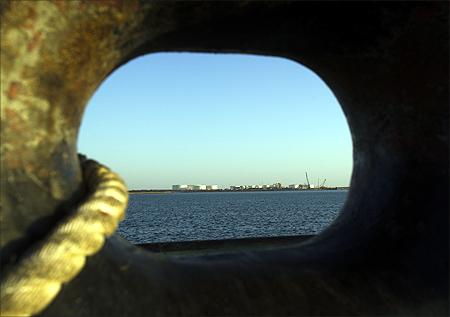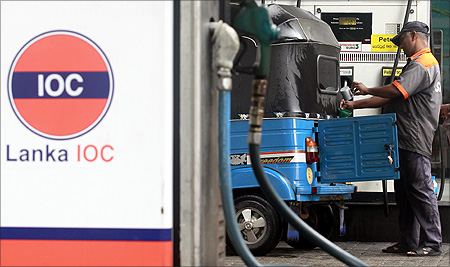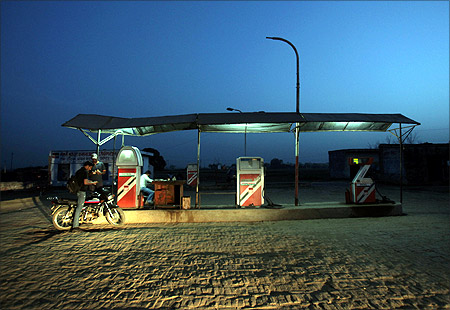 | « Back to article | Print this article |
Is Asia doing enough to curb Iranian oil purchases?
Asia's buyers of Iranian crude believe they've cut their purchases from Tehran enough to justify an extension of their U.S waivers, and strictly speaking, they probably have.
The United States this week will likely announce whether China, India and South Korea will join Japan in receiving exemptions allowing them to continue buying Iranian crude.
But even if the waivers are renewed, the question for lawmakers in the United States and Europe is whether they should be asking Asia to do more in their battle against Iran's nuclear programme, which they fear is aimed at developing weapons despite Tehran's insistence it is only for electricity.
Looking at the numbers, only India would have cause for concern as its purchases from Iran are actually up 7.1 percent in the first 10 months of the year from the same period in 2011.
India bought 366,400 barrels per day (bpd) from Iran in October, up 14 percent from September and 17 percent from a year earlier.
Clyde Russell is a Reuters market analyst.
Click NEXT to read more...
Is Asia doing enough to curb Iranian oil purchases?
This was even up from the 328,400 bpd for the first 10 months of the year, ensuring that India remains the top buyer of Iranian oil behind China.
Indian officials will point to the fact that in the first seven months of the contract year that started in April, imports from Tehran are down 12 percent from the same period a year earlier.
While this does show India's refiners have made some effort to cut purchases, the big jump in October imports doesn't look good if they are trying to convince the Americans they really are an ally against Tehran.
Even the Chinese, who have made it quite clear they don't support the concept of sanctions targeting Iran's oil trade, have made deeper cuts than the Indians.
In the first 10 months of 2012, China imported 424,000 bpd from Iran, a drop of 22.2 percent from the same period last year.
Click NEXT to read more...
Is Asia doing enough to curb Iranian oil purchases?
However, how much of this was due to a genuine willingness of the Chinese to at least cooperate with the United States is open to debate.
It's quite possible that China's drop in purchases is more down to the dispute over contract terms at the start of the year and the later insistence that Tehran uses its own tankers to deliver cargoes after European insurers withdrew coverage for vessels carrying Iranian crude.
South Korea has the strongest case for the renewal of its waiver for Iranian crude, having cut purchases by 40 percent in the first 10 months of the year over the same period in 2011.
South Korea imported an average 145,546 bpd from Iran in the year to end October, but after stopping purchases altogether in the middle of the year, refiners in the North Asian nation have once again stepped up buying.
Click NEXT to read more...
Is Asia doing enough to curb Iranian oil purchases?
In October, South Korea bought 186,451 bpd of Iranian oil, and the recent increase in purchases may slightly undermine Seoul's case among Washington lawmakers.
Japan, the other significant buyer of Iranian crude, had its waiver renewed in September and its purchases of Iranian crude were 38.4 percent lower in the first nine months of 2012 over the same period last year.
Although Japan's imports from Iran fell in October from September, they have risen since the middle of the year when purchases stopped amid concern over the measures to prevent European re-insurers, who dominate the global shipping industry, from offering coverage.
What is clear from looking at the big four Asian buyers of Iranian crude is that they made some effort to cut purchases, but seem in recent months to be happy to resume taking cargoes, albeit at lower volumes than in past years.
This tallies with the International Energy Agency's Nov. 13 report, which said Iranian exports rose to 1.3 million bpd in October from 1 million bpd the prior two months.
Click NEXT to read more...
Is Asia doing enough to curb Iranian oil purchases?
Asia's big four took 1.165 million bpd of Iran's October total, meaning that if the Western powers are looking to further squeeze Tehran, they will have to look at Asia to both inflict the pain and take the pain of finding alternate crude sources.
Given the seeming lack of progress on resolving the dispute over Iran's nuclear ambitions and the ongoing defiant tone of Tehran's leaders, it seems that making the crude waivers tougher to obtain may only be a matter of time.
The comfort expressed by officials in Asia's top crude importers may well be short-lived.
Asian importers probably now have two reasons to hope for lower oil prices, firstly to help their own import bills and secondly, lower prices will probably be more effective than sanctions at cutting Iran's revenues, thereby putting further pressure on an already struggling economy.
(Editing by Himani Sarkar)

© Copyright 2024 Reuters Limited. All rights reserved. Republication or redistribution of Reuters content, including by framing or similar means, is expressly prohibited without the prior written consent of Reuters. Reuters shall not be liable for any errors or delays in the content, or for any actions taken in reliance thereon.




